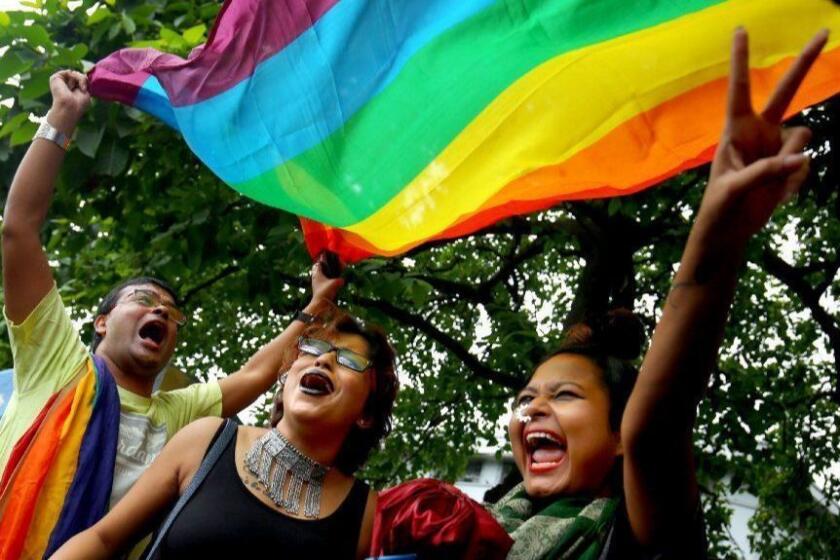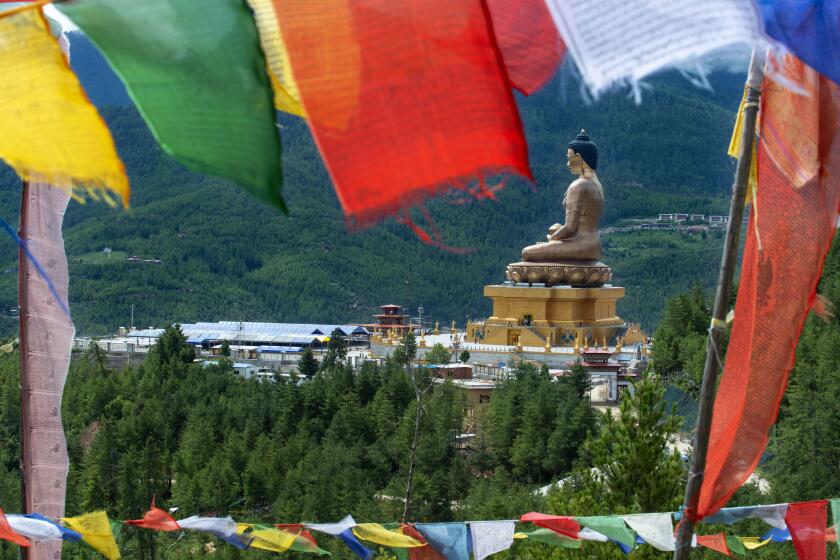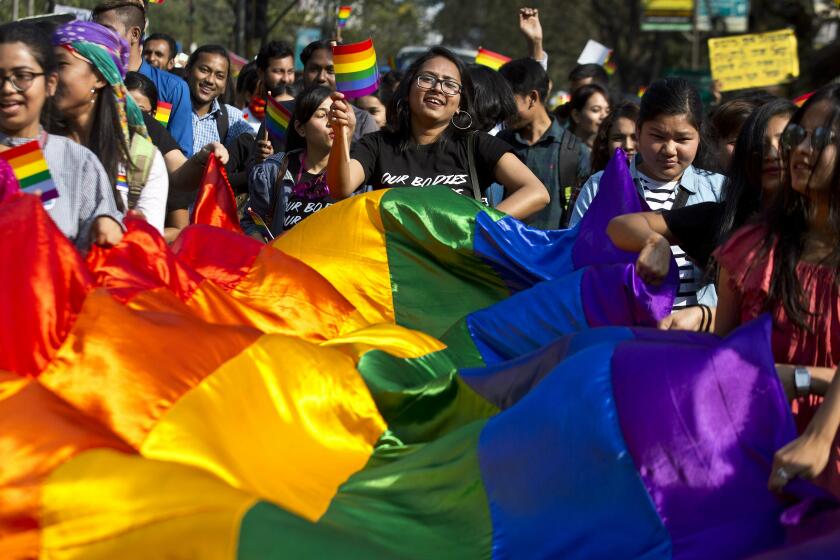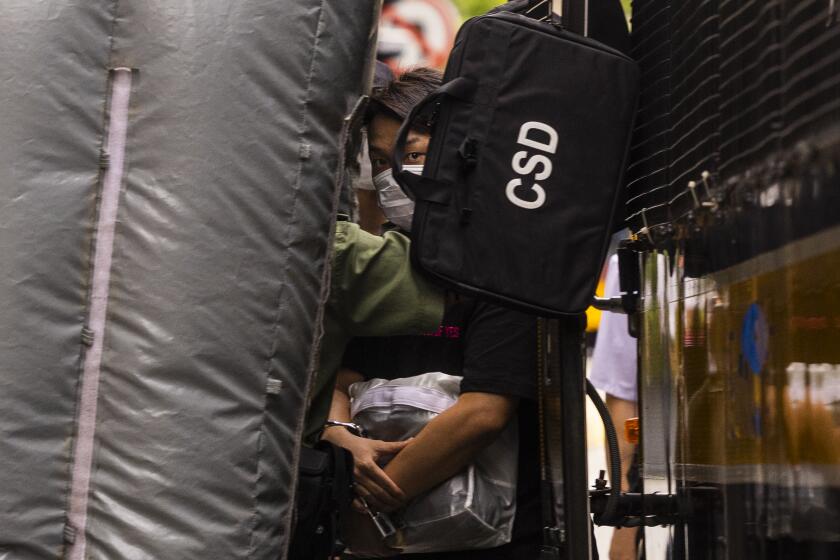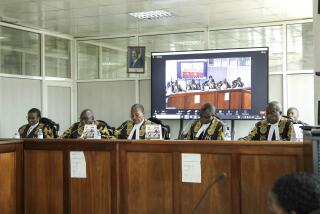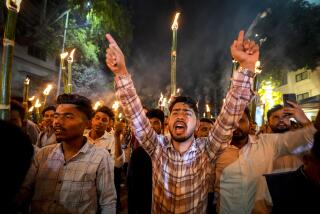India’s Supreme Court refuses to legalize same-sex marriage, saying it is up to Parliament
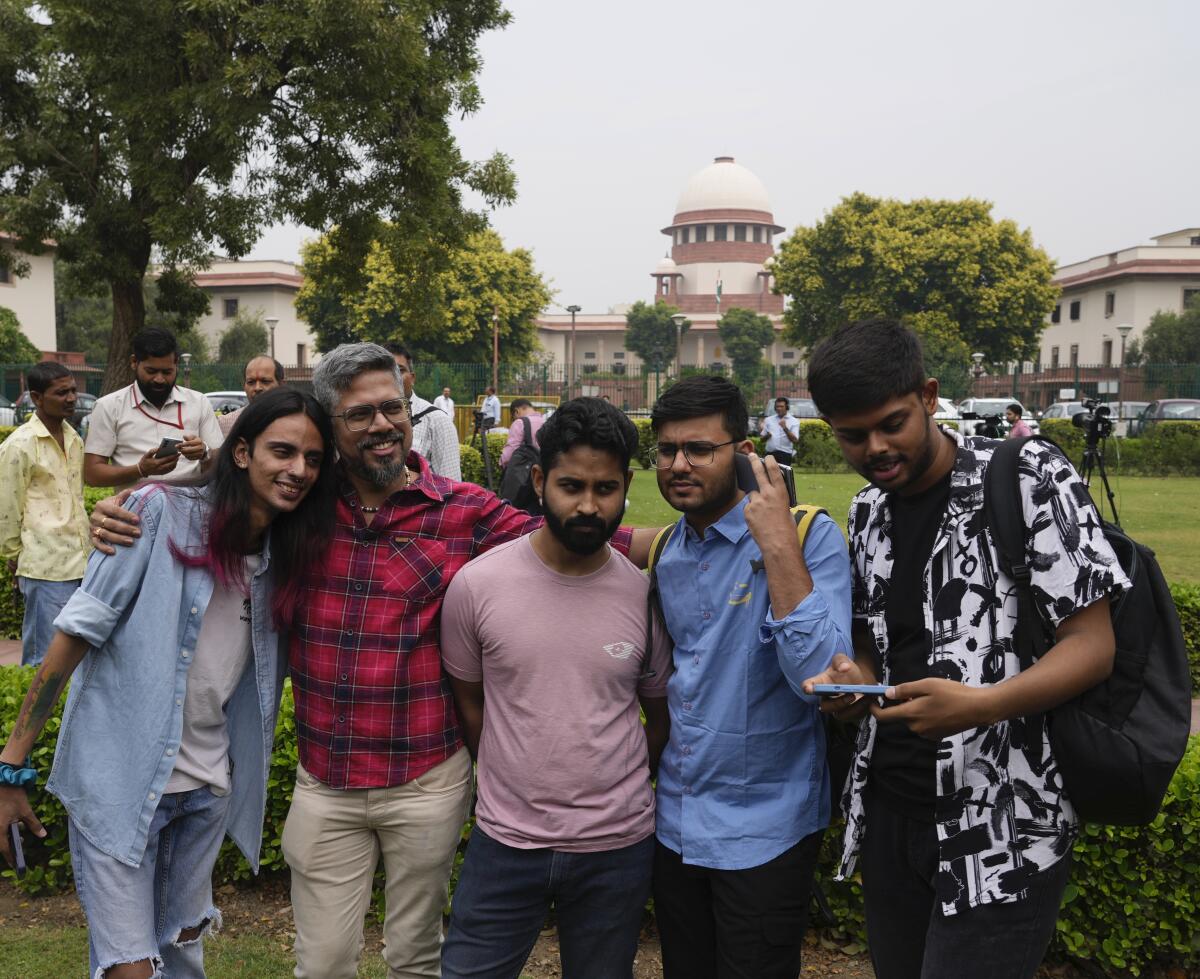
- Share via
NEW DELHI — India’s high court Tuesday refused to legalize same-sex marriage, passing the responsibility back to Parliament in a ruling that disappointed campaigners for LGBTQ+ rights in the world’s most populous country.
Chief Justice D.Y. Chandrachud urged the government to uphold the rights of the queer community and end discrimination against them.
Earlier this year, the five-judge bench heard 21 petitions that sought to legalize same-sex marriage.
Chandrachud said there were degrees of agreement and disagreement among the justices “on how far we have to go” on same-sex marriages, but a majority of the judges agreed that the court cannot grant LGBTQ+ people the right to marry because that is a legislative function.
“This court can’t make law. It can only interpret it and give effect to it,” the chief justice said, reiterating that it was up to Parliament to decide whether it could expand marriage laws to include same-sex unions.
One of the petitioners, Mario da Penha, said it was “a day to be disappointed but not to lose hope.”
When India’s Supreme Court this week legalized same-sex intercourse between consenting adults, it buried, most likely forever, a 157-year-old law introduced during British colonial rule.
“There’s been tremendous work that has gone into these petitions, and many hopes and dreams of the queer community attached to them — to lead lives that most other Indians take for granted. The fact that the dream could not come to fruition today is a disappointment for all of us,” he said.
He added that it was not yet clear if the court had set a mandate or timeline for Parliament to act. “Without that mandate, there is no pressure on Parliament to enact any legislation,” he said.
“There are queer couples today that are already families and in relationships, and are pillars of society. That they are not afforded the dignity and rights that they are due is deeply disappointing,” said Karuna Nundy, one of the lawyers representing the petitioners.
Legal rights for LGBTQ+ people in India have been expanding over the last decade, mostly as a result of the Supreme Court’s intervention.
Bhutan, which measures progress with a ‘gross national happiness’ metric, has decriminalized gay sex and seen a rise in LGBTQ acceptance and activism.
In 2018, the top court struck down a colonial-era law that had made gay sex punishable by up to 10 years in prison, and expanded constitutional rights for the gay community.
The decision was seen as a historic victory for LGBTQ+ rights, with one judge saying it would “pave the way for a better future.”
Despite this progress, Prime Minister Narendra Modi’s government resisted the legal recognition of same-sex marriage and rejected several petitions in favor.
During the hearings, the government argued that a marriage is only between a biological male and a biological female, adding that same-sex marriages went against religious values and that the petitions reflected only “urban elitist views.” Religious groups, too, had opposed same-sex unions, saying they went against Indian culture.
In India, where being gay is a crime, a royal son was shunned when he told his secret. Now he fights to change the law and public mind-set.
Adish Aggarwala, the president of the Supreme Court bar association, said the court had done the right thing by recognizing that this was a job for Parliament, an argument the government also made during the hearings.
Lawyers for the petitioners argued that marriage is between two people, not just a man and woman. They said that concepts of marriage have gradually changed with time and that laws should acknowledge that.
By not recognizing such unions, the government was depriving same-sex couples of their right to equality enshrined in the constitution and rights enjoyed by married heterosexual couples, such as those regarding adoption, medical insurance, pensions and inheritance, they argued.
“This court needs to push society to acknowledge same-sex marriage,” one of the lawyers said.
Breaking News
Get breaking news, investigations, analysis and more signature journalism from the Los Angeles Times in your inbox.
You may occasionally receive promotional content from the Los Angeles Times.
Petitioners were hopeful that the Supreme Court could challenge the government’s position.
Some of the justices urged the state to make sure queer couples don’t face harassment or discrimination in accessing basic needs, like opening a joint bank account. They called for steps to raise awareness among the public about queer identity, and to establish hotlines and safe houses for those in the queer community who are facing violence.
The chief justice also rejected the government’s assertion that being queer was an “urban” concept, saying it’s not just “an English-speaking man” or a “white-collar man” who can claim to be queer, but equally “a woman working in an agricultural job in a village.”
But overall, all five judges stopped short of granting legal recognition to same-sex unions.
In a landmark court ruling, an activist in Hong Kong has partially won his appeal seeking recognition for same-sex marriages registered overseas.
Instead, the court accepted the government’s offer to set up a special panel that will explore granting social and legal benefits to same-sex couples.
Homosexuality has long carried a stigma in traditional Indian society, even though there has been a shift in attitudes toward same-sex couples in recent years. India now has out gay celebrities, and some high-profile Bollywood films have dealt with gay issues. According to a Pew survey, acceptance of homosexuality in India increased by 22 percentage points to 37% between 2013 and 2019.
But same-sex couples often face harassment in many Indian communities, whether Hindu, Muslim or Christian.
India is estimated to have at least 2.5 million LGBTQ+ people, according to government figures from 2012. However, gay rights activists and global estimates believe they number at least 10% of the population, or more than 135 million.
In May 2019, Taiwan became the first jurisdiction in Asia to recognize same-sex marriages. In July, Nepal’s Supreme Court issued an interim order enabling the registration of same-sex marriages for the first time. It is still not clear when the court would make its final decision on the case.
More to Read
Sign up for Essential California
The most important California stories and recommendations in your inbox every morning.
You may occasionally receive promotional content from the Los Angeles Times.
